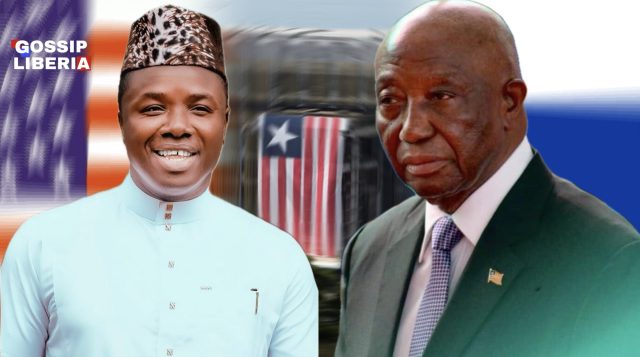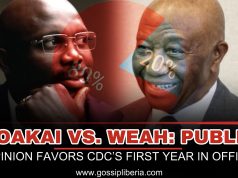Koijee accuses President Boakai of aligning with Russia, warns of worsening security, and calls for citizen action to safeguard Liberia’s longstanding alliances.
Monrovia, Liberia — In a press conference on Tuesday, November 12, 2024, Congress for Democratic Change (CDC) Secretary General Jefferson Tamba Koijee addressed the press, making strong statements about Liberia’s legislative direction under President Joseph Boakai. Koijee raised concerns over Liberia’s relationship with the United States, accusing President Boakai of pursuing ties with Russia in a way that could jeopardize the country’s alliance with its longstanding ally, the United States.
Koijee reminded the press of Liberia’s close relationship with the U.S. since 1847 and highlighted the diplomatic break with Russia in 2022, when Liberia aligned with the U.S. and others in opposing Russia’s war with Ukraine. He suggested that President Boakai’s recent moves to strengthen ties with Russia could strain Liberia’s crucial partnership with the United States, a relationship Koijee said Liberia “cannot afford to lose.”
Reference to Dr. Pailey’s Speech
Koijee cited remarks made earlier this year by Dr. Robtel Neajai Pailey, an orator who openly criticized Liberia’s relationship with the U.S. during her 2024 address. Dr. Pailey challenged Liberia’s longstanding perception of a “special relationship” with the United States, calling for a “new strategic partnership based on mutual benefit.” She emphasized that Liberia should “disabuse” itself of the notion that the U.S. relationship was anything more than a calculated alliance, claiming the U.S. has often acted solely in its own interest.
“We must form new strategic partnerships based on mutual benefits and disabuse ourselves of the notion that we have a social relationship with America,” she asserted. “Truth be told, this special relationship only exists in our imagination. Let’s forget the United States was one of the last countries to recognize our independence. Let’s forget the United States has taken more from us than it has given. The U.S. will always serve its own interests above all else.”
Koijee accused President Boakai of financially backing Dr. Pailey’s statement, claiming he gave her $10,000 to endorse anti-U.S. rhetoric. Koijee also alleged that Pailey’s family harbored longstanding grievances with the United States, suggesting this may have influenced her remarks.
Allegations of Government Intimidation
Koijee further accused the Boakai-led administration of targeting specific communities, referencing the recent disappearance of a Muslim businessman who was allegedly taken by police and has not been located since. Koijee claimed that $100,000 of the businessman’s funds were seized, and despite his lawyer’s efforts, no positive developments have emerged regarding his whereabouts.
Describing this as a “silent attack” on Liberia’s Muslim community, Koijee warned of rising tensions and stated that the Boakai government’s actions are “making the nation scarier” for its citizens.
Call to Action and Political Mobilization
Koijee called upon other political groups, revolutionaries, and citizens to act before Liberia’s peaceful environment deteriorates further. He asserted that CDC, once it concludes its current outreach in Grand Bassa County, intends to bring an “unprecedented force” to counter the Boakai administration.
In a closing note, Koijee also criticized the Liberia National Police, alleging they had become agents of personal vendettas against citizens, which he said adds to the current climate of fear.
“Liberia is going to get scarier under President Boakai if the masses don’t take action soon,” he concluded, emphasizing that CDC would not hesitate to confront what he described as threats to Liberia’s peace and security.
Koijee’s statements have intensified political tensions in Liberia, with the public now closely watching the potential impact of the Boakai administration’s foreign policy moves and its effects on Liberia’s relationship with the United States.












